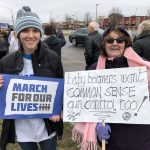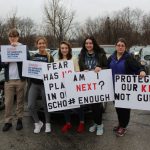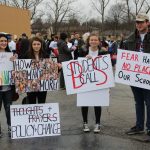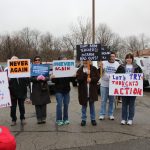By: Chase Merwin
The Valentine’s Day tragedy in Parkland, Florida, seems to have been the final straw for millions of Americans nationwide, especially students.
All across the country, America’s youth have taken on leadership roles in organizing, planning and executing local movements to convince politicians of “common sense gun reform.” They took on the ‘March for Our Lives’, the master movement created by those Parkland students who, having experienced the tragedy, decided enough was enough.
Locals in St. Joseph were no less inspired. Organizations from not only the community but also the university were equally involved in giving students an exclusive voice for gun control. These organizations included Moms Demand Action, the Buchanan County United Democrat Club and student organization Women of the Future.
Dr. Melinda Kovacs, professor at Western and faculty advisor for Women of the Future, said that while many organizations sponsored St. Joseph’s ‘March for Our Lives’, it was really about the students’ voices.
“One of our most important areas of emphasis was that ‘March for Our Lives’ was a student movement, a student event and student moment in American politics,” Kovacs said. “Once the local march happened, nobody from any of these groups spoke.”
Dr. Marianne Kunkel, assistant professor of creative writing and publishing, was an active participant in the movement. She said that teachers’ involvement with students in the ‘March for Our Lives’ was imperative because students should not have to worry about their lives on top of course work and other responsibilities.
“I feel for my students who, with everything they’re trying to tackle, have to worry about their safety on campus,” Kunkel said.
Kunkel also said that she found inspiration in the uprise of students for the ‘March for Our Lives’.
“I find their ability to speak very articulately back to politicians so inspiring,” Kunkel said. “They make me feel like I haven’t done enough with my life.”
Dr. Cynthia Jeney, associate professor of English, was another faculty member involved in the ‘March for Our Lives.’ She said that the importance of student-teacher involvement was especially important in colleges, as many college students are parents.
“We’re together in this; it’s all of us,” Jeney said. “I teach in a university and usually it’s only a matter of two or three years between when I have a student in one of my upper-division courses and that person is a professional and a parent.”
Joseph Kellogg, a student advocate and participant of ‘March for Our Lives’, said that the problem of gun violence can no longer be overlooked.
“The Parkland students lived through the school shooting but then all of us know what it’s like to have that fear,” Kellogg said. “People can’t ignore the problem anymore.”
Kellogg said the movement has demonstrated that young people do care about the politics and future of the world they’ve grown up in, despite popular misconceptions.
“I’m very interested in politics – that’s what I want to do,” Kellogg said. “I want to help make a difference, and it’s shown me that it’s possible. A lot of times people dismiss our generation as lazy or apathetic but this movement stands in direct contrast.”
The ‘March for Our Lives’ garnered much support, from students to teachers and everyone in between. Students’ voices are finally being heard, and the movement, while preceded by a horrible tragedy, was a rousing call to millions of Americans nationwide. While nothing has been changed yet, it may be safe to assume that it is just over the horizon.







